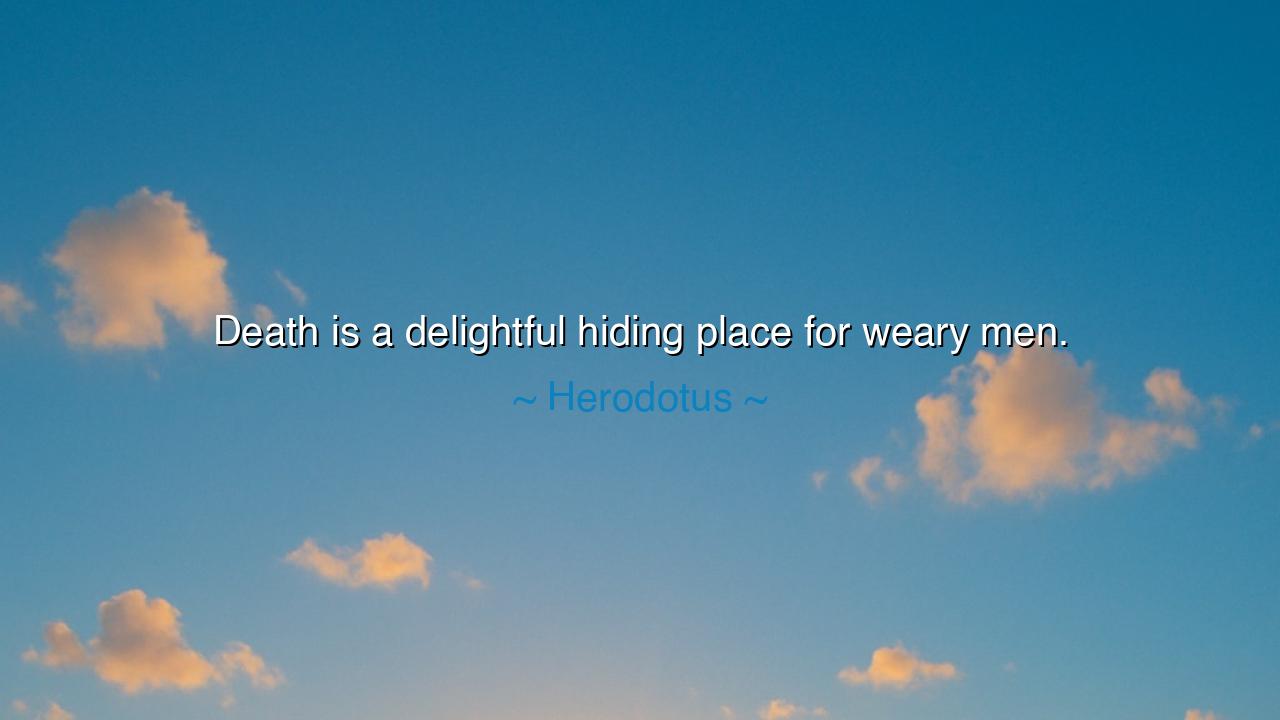
Death is a delightful hiding place for weary men.






“Death is a delightful hiding place for weary men.” — Herodotus
In this solemn and haunting line, Herodotus, the Father of History, touches the eternal mystery that has both frightened and comforted humankind since the dawn of time. When he writes, “Death is a delightful hiding place for weary men,” he does not glorify death, but rather acknowledges its strange gentleness — the peace it offers to those who have borne the full weight of life’s sorrow and struggle. For Herodotus, who chronicled the wars, ambitions, and sufferings of kings and nations, death was not merely an ending, but a resting place — a refuge beyond toil and torment, where the soul lays down its burdens and is still.
To understand his meaning, we must remember that Herodotus lived in an age when life was harsh and uncertain. He saw men march into endless wars, empires rise and fall, and the proud laid low by fate. In the ancient world, death was not yet wrapped in the fear of damnation or the promise of paradise — it was seen as part of the natural order, the final turning of the wheel. When he called it “delightful,” he spoke as a weary observer of humanity, one who had witnessed suffering enough to see mercy in the stillness that follows struggle. For the weary man, death was not horror, but homecoming — the final silence after the storm.
The ancients often regarded death as a return, not a loss. To the Stoics, it was the natural end of life’s cycle, as rest follows labor and sleep follows day. The Greek tragedians saw it as the only moment when mortals might be freed from pain, envy, and desire. Sophocles wrote that “not to be born is best of all,” and that the next best is “to return quickly whence we came.” Such reflections were not born of despair but of acceptance — an understanding that to be human is to struggle, and that death, though dark, restores balance to a world of endless striving. Herodotus’ words carry that same wisdom: he does not call life meaningless, but reminds us that even the most valiant soul must, at last, rest.
There is a story told of King Croesus, whom Herodotus himself wrote about. Once the richest man in the world, Croesus believed himself blessed above all mortals — until he was overthrown, defeated, and brought in chains before the Persian conqueror Cyrus. Facing death, he recalled the words of the Athenian sage Solon, who told him that no man can be called happy until his end is known. In that moment, as the flames of his execution pyre were lit, Croesus understood — life is uncertain, full of fortune and loss, but death ends the wheel of change. In the end, even the conquerors and the conquered find the same peace. To such men — proud, wounded, and weary — death indeed may seem a delightful hiding place.
Yet Herodotus’ reflection is not a call to seek death, but to revere its mystery. It is a reminder that to live fully, one must accept the reality of rest. Those who fear death often fear life itself, for they cling to what must inevitably pass. The wise do not hasten the end, nor do they shrink from it; they walk their path with courage, knowing that each breath brings them nearer to the great stillness. To the weary, death’s promise of peace is not cruel but compassionate — a truth that gives life its urgency and its depth.
But we, the living, must learn to find moments of that peace even before death arrives. For if death is rest, then life must also contain its pauses — moments of reflection, surrender, and renewal. The spirit grows weary not only from labor, but from forgetting how to be still. In remembering Herodotus’ words, we can learn to lay down our burdens before the grave claims us — to find “hiding places” of peace within the hours of our days: in silence, in gratitude, in love. Thus we live not in fear of death, but in harmony with its wisdom.
Lesson:
From Herodotus, we inherit the understanding that death is neither punishment nor enemy, but the final mercy of nature to her children. Do not hasten toward it, but neither flee from its thought. When you are weary, remember that peace awaits — not as an escape from life, but as its fulfillment. And until that hour comes, seek in life what death represents: rest, release, and balance. Honor your struggles, but do not be ruled by them. Live bravely, love deeply, and when the journey grows long, remember that the universe itself provides rest for all weary souls — a delightful hiding place, where all striving ceases and all things are made whole once more.






AAdministratorAdministrator
Welcome, honored guests. Please leave a comment, we will respond soon